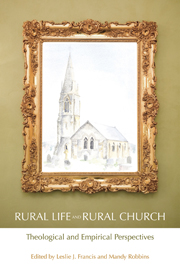Book contents
- Frontmatter
- Contents
- Preface
- Foreword by The Bishop of Shrewsbury, The Rt Revd Mark Rylands
- 1 Introduction: shaping rural theology
- PART 1 PERSPECTIVES FROM THE BIBLE
- PART 2 PERSPECTIVES FROM ORDINARY THEOLOGY
- PART 3 THEOLOGICAL AND SOCIOLOGICAL PERSPECTIVES
- PART 4 HISTORICAL PERSPECTIVES
- PART 5 LISTENING TO VISITORS
- PART 6 LISTENING TO THE COMMUNITY
- PART 7 LISTENING TO CHURCHGOERS
- PART 8 LISTENING TO CHURCH LEADERS
- 24 Deployment of the churches' ministry: Anglicans and Methodists in a rural diocese
- 25 Views on baptism and confirmation in the Church in Wales: are rural clergy different?
- 26 Children and communion: listening to churchwardens in rural and urban Wales
- PART 9 SATISFACTION AND STRESS IN MINISTRY
- Contributors
- Sources
- Subject Index
- Name Index
26 - Children and communion: listening to churchwardens in rural and urban Wales
from PART 8 - LISTENING TO CHURCH LEADERS
- Frontmatter
- Contents
- Preface
- Foreword by The Bishop of Shrewsbury, The Rt Revd Mark Rylands
- 1 Introduction: shaping rural theology
- PART 1 PERSPECTIVES FROM THE BIBLE
- PART 2 PERSPECTIVES FROM ORDINARY THEOLOGY
- PART 3 THEOLOGICAL AND SOCIOLOGICAL PERSPECTIVES
- PART 4 HISTORICAL PERSPECTIVES
- PART 5 LISTENING TO VISITORS
- PART 6 LISTENING TO THE COMMUNITY
- PART 7 LISTENING TO CHURCHGOERS
- PART 8 LISTENING TO CHURCH LEADERS
- 24 Deployment of the churches' ministry: Anglicans and Methodists in a rural diocese
- 25 Views on baptism and confirmation in the Church in Wales: are rural clergy different?
- 26 Children and communion: listening to churchwardens in rural and urban Wales
- PART 9 SATISFACTION AND STRESS IN MINISTRY
- Contributors
- Sources
- Subject Index
- Name Index
Summary
Abstract – A survey of Church in Wales churchwardens undertaken during 2003 in the dioceses of Bangor and Llandaff included twelve questions central to the idea of children receiving communion before confirmation. Analyses of the responses to these questions show few differences in the views of churchwardens from rural parishes compared with the views of church-wardens from urban parishes. More significantly, when compared with studies concerning the views of Church in Wales clergy on children receiving communion before confirmation, churchwardens emerge as notably less supportive than clergy. It is argued that clergy and church-wardens need to work closely together to ensure that parishes move forward in an agreed way.
Introduction
The New Testament is not particularly helpful in providing information about children and communion. Certainly there is evidence that children were present at worship from the earliest times and this may well have included the Eucharist. Strange (1996) has suggested that if the earliest Christians saw some similarities between the Eucharist which commemorated the sacrifice of Christ, whom Paul described as ‘our Passover lamb’ (1 Corinthians 5:7), and the Passover celebration already familiar to them, then we might expect that children would partake of the Christian meal as they had done of the Jewish one (Exodus 12:21-27). It is a fair point but lacks the support of solid evidence.
More revealing is the effect that another New Testament reference (John 6:53) would seem to have had on St Augustine. This key text in John's Gospel, ‘unless you eat the flesh of the Son of Man and drink his blood you can have no life in you’, appears to have persuaded St Augustine that there could be no halfway house between the unbaptized and the communicant.
- Type
- Chapter
- Information
- Rural Life and Rural ChurchTheological and Empirical Perspectives, pp. 305 - 314Publisher: Acumen PublishingPrint publication year: 2012

